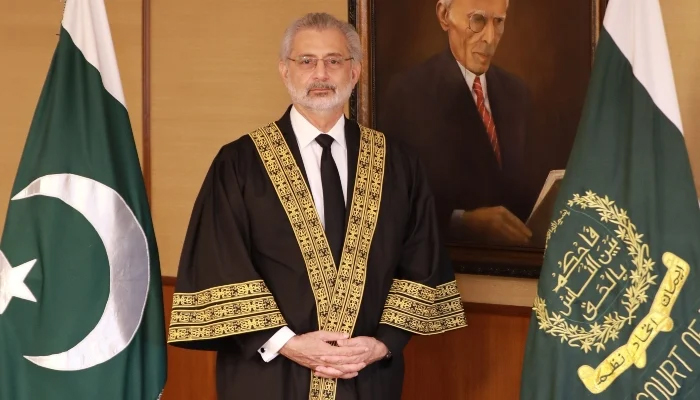PBC strongly condemns slanderous campaign against CJP Isa
"The court’s decision can’t be allowed to be used for political gains," says top lawyers' body
February 22, 2024

The Pakistan Bar Council (PBC) has strongly condemned the "malicious and slanderous campaign" against the Chief Justice of Pakistan (CJP) Qazi Faez Isa.
In a statement issued on Thursday, PBC Vice Chairman Riazat Ali Sahar and Chairman Executive Committee Farooq Hamid Naik said the campaign was designed to bring the Supreme Court into disrepute and make the CJP vulnerable by deliberately attempting to distort a decision of the Supreme Court.
The PBC statement referred to the SC order issued by a bench comprising CJP Isa and Justice Mussarat Hilali on a set of appeals filed by petitioner Mubarik Ahmad Sani against an order of the Lahore High Court order.
Sani was accused of distributing/disseminating a proscribed book, Tafseer-e-Sagheer, which as per the prosecution, was an offence under the Punjab Holy Quran (Printing and Recording) (Amendment) Act enforced in 2021. However, the FIR alleged that he had done the act in 2019 when it was not an offence.
"The court’s decision can’t be allowed to be used for political gains and some elements have used completely false and forged information to incite violence and hatred," the top lawyers' body said.
The PBC demanded urgent and robust action against all those involved in this dangerous and nefarious campaign to malign the judicial system and create mistrust in judges "so as to erode independence of judiciary which tantamount to creating obstacles in progress of Pakistan and tarnishing image of Pakistan".
Earlier today. the apex court slammed the “organised campaign” against judges as “unfortunate”, noting that directly attacking the jurors was against freedom of expression.
The top court lamented that in dealing with cases pertaining to offences against religion facts give way to emotions, and Islamic commands are not heeded.
“Confusion is spreading due to the erroneous reporting on print, social, and electronic media about an order. An impression is being given that the Supreme Court has deviated from the Constitution’s definition of a Muslim and also called for ending the punishments for religious offences under the Pakistan Penal Code,” it added. “This impression is totally wrong.”
The statement mentioned that the top court had noted in the aforementioned case, the judges had noted that even if all the offences included in the FIR were accepted as they were, they were not applicable to the petitioner.











